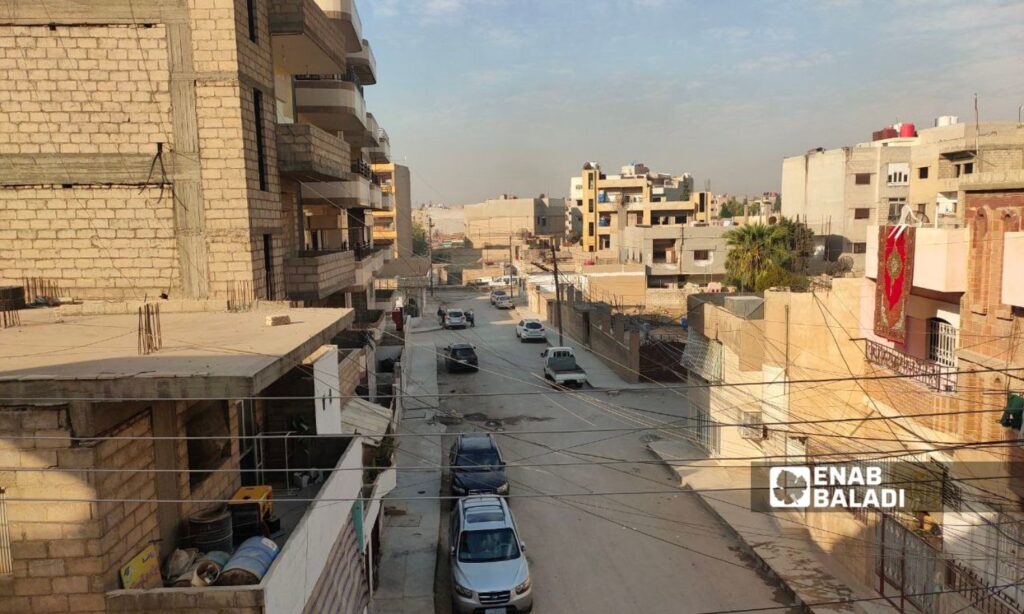Al-Hasakah – Majd al-Salem
In December 2024, Mohammed was surprised by an attempt to break the front door of the building he lives in, in Qamishli, by a military force consisting of three pickup trucks belonging to the Syrian Democratic Forces (SDF).
These forces were attempting to break the door with a hammer, and when he intervened and asked for clarification about what was happening, the soldiers claimed there was a “sleeper cell” on the upper floor of the building (which has two stories) and that they wanted to search the apartment.
According to Mohammed (a pseudonym for security reasons) in his conversation with Enab Baladi, there was a verbal altercation with the soldiers who eventually said they wanted to take the empty upper apartment to house “unknown” persons.
Mohammed refused this, especially since it was clear that the action was “intended to be done by force.” Afterward, dozens of neighbors gathered and prevented the seizure of the apartment by standing with the young man, prompting the patrol to withdraw from the neighborhood.
Warnings of demographic change
Enab Baladi has reported that SDF has seized several empty homes after their owners left, in the al-Khalij and al-Masaref neighborhoods in Qamishli, granting them to some of its affiliated leaders.
The Assyrian Human Rights Network accused, on December 26, 2024, entities said to be close to the Autonomous Administration of North and East Syria (AANES) of seizing homes owned by Christians.
It stated in a post that armed security forces affiliated with what is known as “Asayish” had, in recent days, broken the locks of several homes and forcibly opened their doors in the al-Wusta and al-Gharbi neighborhoods of Qamishli, as well as in the Martyrs housing and al-Mahatta housing and Tel Azza area in al-Hasakah governorate.
It added that the owners of these homes included Milad Mansour, Yukhna Mando, and Iskander Kurkis, along with ten other properties whose owners were unknown. These properties were resided in by displaced persons from Afrin and Aleppo, “most of whom are local leaders affiliated with AANES.
The Assyrian Network, which defines itself as a “Swedish-Syrian human rights organization working to document violations and crimes committed against the Suryani-Assyrian component,” indicated that the seizure raises significant concerns about the potential existence of intentions to bring about demographic change in the region, which AANES has practiced in the villages and towns of the Khabour area, predominantly inhabited by Assyrians, in recent years.
Another case reported by Enab Baladi in the al-Gharbi neighborhood in Qamishli involved a patrol from SDF seizing the home of Dr. “J.M.” on the pretext that the apartment was empty. He was shocked to receive a call from one of his neighbors while he was in the village, informing him that his house had fallen into the hands of the SDF, which intended to house a displaced person there.
According to what Enab Baladi learned from one of his relatives, Dr. “J.M.” was previously living abroad in one of the Gulf countries and returned to Syria several years ago, preferring to live in his village south of Qamishli.
Currently, the doctor will be forced to move his family from the countryside to the city to occupy his apartment to avoid giving the SDF an excuse that the apartment is empty, and thus they might seize it, according to one of his relatives.
Forceful seizure of property
Attorney Abdel Rahim Suleiman (35 years old) from Qamishli told Enab Baladi that such incidents are termed “forceful seizure of property,” and the remedy, if the property owner is present, is to file a lawsuit against the person who has occupied the property, regardless of the entity “behind it.”
Before that, the person must approach the neighborhood chief (the representative appointed by AANES), who then refers them to the conciliation committees (special committees in each neighborhood that attempt to resolve various issues through mutual agreement between the parties). If there is no cooperation in vacating the house, the committees will escalate the case to court.
The Assyrian Network called on AANES, as a de facto authority under international law, to fulfill five demands:
- The immediate cessation of the seizure of homes belonging to Suryani-Assyrian citizens, as they are considered illegal and arbitrary practices.
- The return of seized homes to their legitimate owners or their legal representatives without delay or evasion.
- Finding other legal and effective solutions for housing displaced families from conflict areas and ensuring protection for them as soon as possible.
- Protecting community peace and respecting the privacy of the components of the national fabric in the Jazira region, including Arabs, Kurds, Suryani-Assyrians, Muslims, Christians, and Yazidis.
- Not tampering with the demographic diversity in the cities, villages, and towns of the Jazira region.
The Assyrian Network has pointed out that it will continue to follow up on this issue with the relevant parties locally and internationally in the coming days to hold accountable those responsible for these violations.











